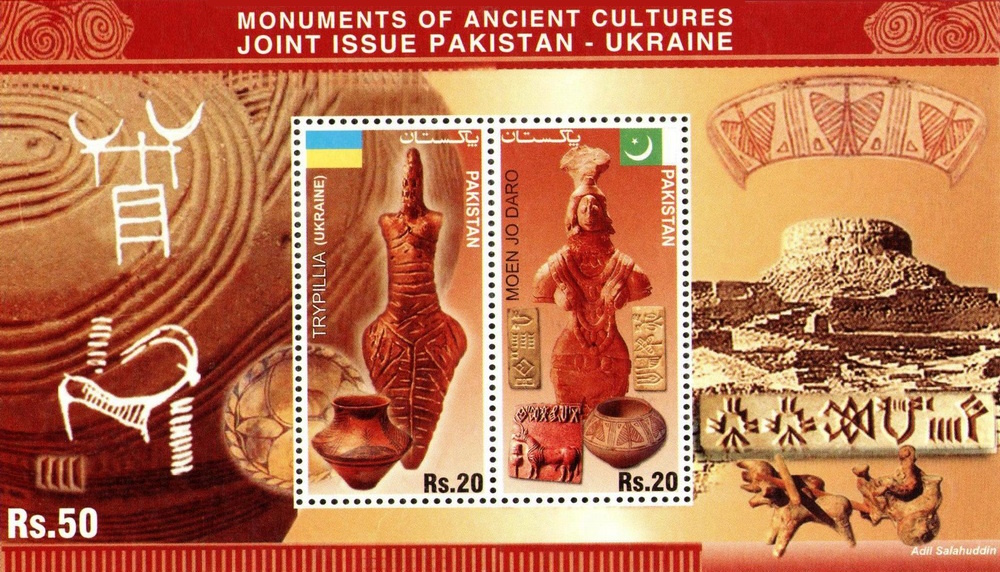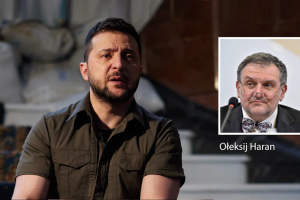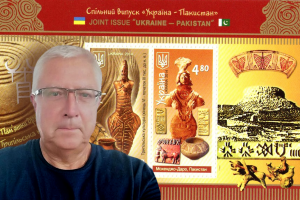Proto-cities of Memory: Trypillia, Mohenjo-Daro and the Choice of Civilization – Volodymyr Lakomov
Source: Літературна Україна
 Volodymyr Lakomov (b. 1958) is a Ukrainian diplomat, Ambassador Extraordinary and Plenipotentiary of Ukraine (he represented Ukraine’s interests as Ambassador to Angola (2004–2007), Brazil (2007–2010), and Pakistan (2012–2020)), and an expert of the Ilko Kucheriv Democratic Initiatives Foundation.
Volodymyr Lakomov (b. 1958) is a Ukrainian diplomat, Ambassador Extraordinary and Plenipotentiary of Ukraine (he represented Ukraine’s interests as Ambassador to Angola (2004–2007), Brazil (2007–2010), and Pakistan (2012–2020)), and an expert of the Ilko Kucheriv Democratic Initiatives Foundation.
In the depths of history, before imperial anthems were sung, there existed civilizations that chose another model of existence — harmonious, ritual, decentralized. Mohenjo-Daro on the banks of the Indus and the Trypillian settlements along the Dnipro — two cultures that did not seek to conquer the world but left a mark in its symbolic landscape.
Mohenjo-Daro — a city with straight streets, public baths, and a complex drainage system. Architecture without palaces, without temples, without monarchs. As if a society that knew how to live without centralized power but with a high level of organization. Seals depicting bulls, unicorns, dancers — not as tools of power, but as signs of the inner world.
Trypillia — not a city in the classical sense, but a proto-city: settlements that preceded urbanization yet already displayed features of complex social organization. A culture that built settlements in spiral form, ritually burned them, and rebuilt them anew. Pottery that speaks the language of ornament: spirals, waves, female figures. Here there were no imperial ambitions, but there was a deep metaphysics of the earth, fertility, and the cycle.
Both civilizations disappeared — not because they were weak, but because they did not strive to become stronger than others. Their strength lay in symbol, in rhythm, in the ability to live without violence. They left behind no armies, but they left behind aesthetics. They did not create empires, but they created myth.
This myth is alive. In 2014, Ukraine and Pakistan carried out a joint philatelic gesture: the release of a block of postage stamps “Monuments of Ancient Cultures” — the Trypillian culture and Mohenjo-Daro. This was not just philately — it was a symbolic dialogue between two peoples that remember their pre-colonial roots.

On the Ukrainian version of the block — a deep visual symphony:
On the left — a Trypillian female figurine with raised arms, a painted bowl, a goblet with plant ornament. This is the image of fertility, cyclicality, earthly ethics.
On the right — a Pakistani seal with a unicorn, a terracotta goddess figure, a toy cart with oxen. This is myth, trade, childhood, faith.
In the background — fragments of pottery, petroglyphs from Kamyana Mohyla, ruins of the Mohenjo-Daro stupa, a scene of dancing figures. At the top — inscriptions in Ukrainian and English: Joint Issue “Ukraine – Pakistan.” Nearby — national flags, coats of arms, and the visual equality of two cultures.
This block is not just a stamp. It is a cultural declaration: about the dignity of pre-colonial civilizations, about the right to one’s own model of development, about dialogue without domination. In a world where empires once again try to dictate the rules, Ukraine and Pakistan chose another path — memory, aesthetics, coexistence.
In this context, Timothy Snyder’s concepts become especially relevant — particularly his idea of the “politics of memory” as a struggle for the future. Snyder emphasizes: empires do not merely conquer territories — they rewrite the past. In his book The Road to Unfreedom, he shows how the idea of the “end of history” — the belief that ideas no longer matter — became an instrument of modern authoritarianism. Therefore, the recovery of pre-colonial narratives such as Trypillia is not archaism, but an act of historical resistance. It is a way to reclaim the right to another — non-imperial — vision of civilization.
Today, as the world again balances between centralization and freedom, it is worth remembering these proto-cities. As an alternative. As a reminder that civilization is not only about power, but also about forms of coexistence. And that Ukraine, as the heir of Trypillia, has the right to its own model — not imperial, but humane.
Volodymyr Lakomov specializes in political philosophy, global diplomacy, and cultural introspection. He is the author of studies dedicated to freedom in Timothy Snyder’s interpretation, Ukraine’s role in dialogue with the Global South, and the visual comprehension of contemporary concepts.








